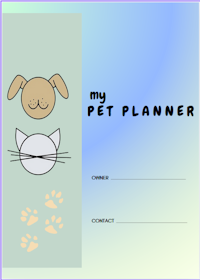West Highland White Terrier
One Of The Most Popular And Appealing Breeds!
The West Highland White Terrier, fondly known as the Westie, was developed in the highlands of Scotland over a hundred years ago. Its closest genetic relative appears to be the Cairn, while other highland terriers that were likely involved in its development, include the Scottish, Sealyham, Skye and Dand1e Dinmont.
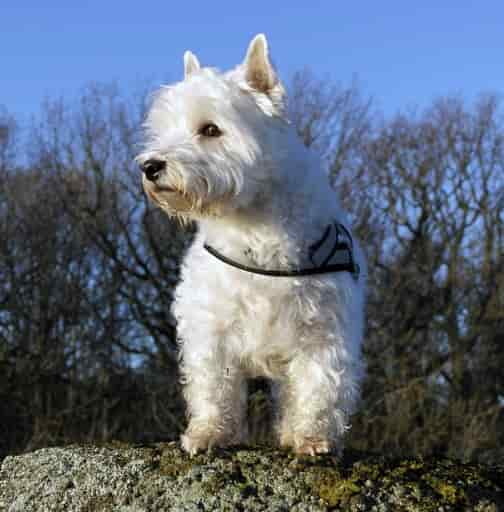
Credit is given to the Malcolm family of Poltalloch in Argyllshire for originally establishing
the breed as we know it today. Apparently, after a reddish-colored Cairn terrier was accidentally
mistaken for the fox and shot during a hunting event, Colonel Malcolm resolved to breed only for
white dogs to prevent further sad mistakes.
Origins
The Westie has a history as both a working and a hunting terrier. He was used on the farms and
also in industrial settings to control the vermin.
As a bold and hardy earth dog, the
Westie has one of the best reputations for hunting fox, rabbit, otters and badgers among the
cairns and rocks of the Scottish highland terrain.
Prior to 1909, the Westie was known as the Roseneath Terrier, after a residence in Scotland owned by the Duke of Argyll.
Today, this breed is a popular family pet and show dog. He is a very attractive and compact dog with a beautiful coat and a charming expression. His good looks have earned him quite a few gigs in advertising and television commercials.
West Highland White Terrier Characteristics
The Westie is a strong willed dog with a lot of confidence. For this reason, obedience training is advised to provide firm leadership and establish the owner's position as the boss.
Consistency along with patience, but never harshness, will usually get the job done and they are considered to be quick learners.
The West Highland White Terrier can best be described as mischievous and fun loving. He very much enjoys being around people and is generally friendly with other pets.
Being very alert and prone to bark, he will warn of any outside disturbances. He also has a fondness for digging, so make sure your favorite landscaping is well protected.
Physical Stats and Grooming
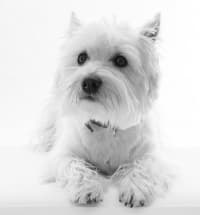
Height: 11 inches
Weight: 15-22 lbs.
Color variations: White only
Similar to most terrier breeds, The West Highland White Terrier has a double coat, the topcoat being hard and quite long and the
undercoat soft and furry.
Grooming with a high quality brush such as this one and a steel comb is needed daily or at least 4 to 5 times a week. A grooming tip is to apply cornstarch to the coat which when brushed out, will bring the dirt with it.
If you have a Westie dog you plan to enter into AKC shows, the coat must be hand stripped to retain it natural condition.
Clipping can be done for easier coat maintenance for family companions.
With adequate grooming, Westies are low-odor dogs and shedding is about average. Bathe only as needed.
Activity Level
Most Westies will be content with two walks of moderate length on a daily basis.
Westies are quite athletic and do well in canine sports including agility and because they have the digging gene of terriers, they really excel in earthdog events. Most of these events can be located through your local Humane Society or the breed club.
An outside area for play is a
good alternative for days when a walk or other activities are not possible, but make sure it is well secured as
Westies still have very strong chasing instincts.
They are also quite energetic indoors most of the time.
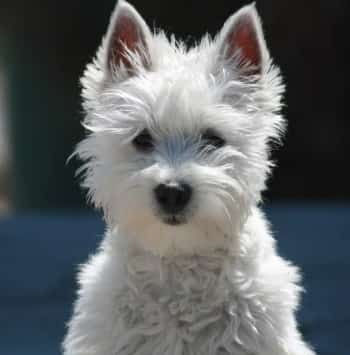
Health Notes
West Highland White Terriers are mostly healthy dogs with a life expectancy of up to 16 years when receiving good veterinary care and high quality nutrition.
Some health issues that are associated with the breed or may affect them during their lifetime include:
- Legg-Calve Perthes which is a hip condition usually affecting only one hip
- Globoid Cell Leukodystrophy, also known as Krabbe disease. A very serious and usually fatal genetic disease - more details here.
- Atopic Dermatitis
- Hyperplastic Dermatosis - a severe condition specific to the breed but not often seen.
- Juvenile Cataracts
Responsible breeders will be aware of all diseases associated with the Westie and will have health screening and tests carried out before breeding the parents. Ask to see the results when you visit with a breeder.
Ideal Living Space
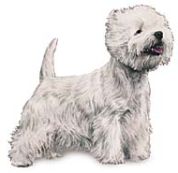
The West Highland White Terrier can easily adapt to any accommodations.
They don't need a yard, but to have one is a convenient bonus for necessary functions as well as a perfect area without distractions for training, exercise and let's not forget playtime!
How Does The Westie Do With Children?
For the most part, this breed does best with older children who are considerate and well-educated in the handling of small pets.
While the Westie has a cute and adorable appearance, he is a tough and quite resilient dog that doesn't take kindly to rough handling - just something to bear in mind when choosing a family pet.
No matter what the circumstances, it is always the best policy to have an adult supervising any activities between children and pets.
Companion For Seniors?
The West Highland White Terrier is not a lap dog but he loves companionship, is quite devoted to his owners, and has moderate exercise demands.
While the Westie has a lot of energy, he can be a good choice for the seniors or more sedentary family especially if they have a back yard or can involve him in canine sports to keep him active.
Reading Recommendations

Guide to the Westie Breed
New and experienced owners will find this book an invaluable resource. It will answer all your questions about Westies, everything from nutrition, house training, problem behaviors, to great advice for those pets with separation anxiety. And, because West Highland White Terriers are such handsome little dogs, you'll be delighted with the grooming tips to help you keep him looking good.

West Highland White Terrier Comprehensive Guide
Covers origin and early history and development both in England and the US, prominent American Westie kennels, breed personality and traits, grooming and care, obedience, selection of a puppy, breeding, and health care. Many full color photographs.

